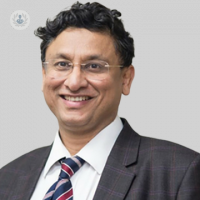Mastectomy: Your expert guide
Escrito por:In this informative article, Professor Jayant Vaidya, a highly respected consultant oncoplastic breast surgeon and professor of surgery, shares his expert insight on what mastectomy surgery entails and what to expect from the post-operative recovery period. Professor Vaidya also discusses the success rates of mastectomy in breast cancer treatment and sheds light on how reconstruction procedures can be combined with mastectomy or delayed according to patient preference.

Is mastectomy a major procedure?
Mastectomy is a major procedure because it involves removal of the whole breast. However, it is a very routinely performed operation and carries little risk of complications. In general, most patients tolerate it very well.
If the mastectomy is accompanied with an immediate reconstruction, which is commonly done, there is a slightly higher chance of having complications. Should any complications occur, we are very well able to treat them as it a commonly performed procedure. We find that patients generally tolerate it very well but like all types of surgery, it cannot be taken lightly. If it is possible to preserve the breast and this reflects the patient’s choice, we try and do that. This depends mainly on the size of the tumour compared to the size of the breast.
What does a mastectomy procedure entail?
A mastectomy procedure is removal of all of the breast tissue. It is not 100 per cent removal as some breast tissue always remains, but essentially it is removal of the breast tissue on that side. In the olden days, it also used to mean removal of all the skin over the breast. Nowadays, we either remove only an ellipse of skin or just the nipple areola complex.
In some cases, we can even preserve the nipple, areola and all of the skin of the breast, known as a nipple and skin preserving mastectomy. We can also preserve just the skin, called a skin preserving mastectomy or we can perform a standard mastectomy in which some skin is taken away, typically over the area of the tumour.
Where reconstruction is done immediately, we try to get the same shape and size as the other breast. If a mastectomy is done without reconstruction, the chest is flat. However, we can always do reconstruction later on as a delayed reconstruction once the cancer treatment is finished.
What is the recovery period like following a mastectomy?
Normally, patients who have a mastectomy can go home the next day after an overnight stay. If they undergo reconstruction, they may stay for two or three days, but in general, patients are able to go home relatively quickly.
The pain after mastectomy can remain for a few days but most patients are able to move about and do their daily activities the next day. After around two or three weeks, patients will be able to do most things without too much trouble. There can be some stiffness of shoulders but in general, good physiotherapy means that people are able to go about their daily business rather quickly.
Can I get a breast reconstruction at the same time as a mastectomy?
Yes, you can undergo reconstruction at the same time as a mastectomy. This is called immediate reconstruction. The type of reconstruction can be either with an implant or with your own body tissue, such as tummy fat or some tissue from your back.
These reconstructions can be done at the same time as the mastectomy but can also be done at a later stage. Some patients prefer to first undergo all the cancer treatment that is required and then have reconstruction later on. It's completely your choice. Sometimes, we prefer the reconstruction to be done at a later stage when the cancer is very big but in general, it can be done usually at the same time.
How successful is mastectomy in the treatment of cancer and can it recur?
Mastectomy is as successful as lumpectomy plus radiotherapy. There is a slightly higher chance of the cancer coming back after a lumpectomy or the removal of the cancer with some normal tissue because some of the breast tissue remains. After mastectomy, that chance is slightly reduced but not by much.
In terms of survival, rates after mastectomy are equivalent to those after lumpectomy and radiotherapy. Overall, it is very successful. Cancer can sometimes recur in the scar but it is not common (less than 5 per cent chance).
If you require mastectomy surgery and wish to schedule a consultation with Professor Vaidya to discuss your treatment plan, visit his Top Doctors profile today.


